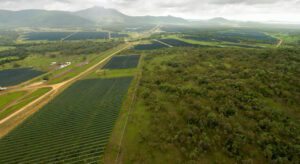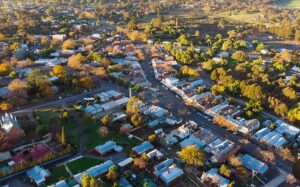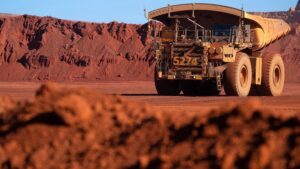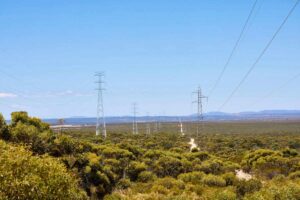Australian clean energy groups put on plenty of bravado when the federal government unveiled the members and the terms of reference of its long-threatened review of the renewable energy target on Monday. “Bring it on,” strutted the Clean Energy Council. The CEC and other groups such as Vestas, the world’s biggest wind turbine maker, and Pacific Hydro, Australia’s biggest specialist investor in renewables, suggested the facts would speak for themselves.
If the clean energy industry thinks that facts will win this argument, it is kidding itself. It has taken the government several months to work out how it will get around its statutory obligation for the Climate Change Authority to conduct the next review. In choosing climate change science denier Dick Warburton to head its inquiry, the Abbott government has chosen someone who has not let facts get in the way of his ideology and policy positions.
Warburton says he is not a climate change denier, but a “sceptic” about the role of humans in climate change. He doesn’t accept the science. Given the consensus of thousands of scientists, all major scientific bodies and all but a couple of rogue governments, then denial and what he calls “scepticism” amount to the same thing.
Warburton has also surrounded himself with people who, like himself, have spent much of their careers fighting environmental initiatives (carbon pricing, renewables) in an effort to protect the interests of the companies they managed or represented. Warburton did this as head of Manufacturing Australia, Shirley In’T Veld as head of Verve Energy, and Brian Fisher, the former head of ABARE and more recently a fossil fuel lobbyist, had a long history of creating modeling that argued against environmental mechanisms.
The purpose of the RET review is purportedly about the cost of the RET to consumers, but these are as well documented and as verifiable as the scores from the last cricket test in South Africa. Each year, the costs are documented by state-run pricing bodies, they have been assessed by the Climate Change Authority, by the Australian Energy Market Commission and countless others. And they all come to the same conclusion – the cost is sweet bugger all, at best 3 per cent of electricity bills even after retailers have been allowed to profit from the inflated prices they charge back to consumers.
What this really is about is protecting the interests of the incumbent retailers, generators, and network providers, many of whom are government owned. They are losing money, and their assets are being forced out of the market. This is very much about self-preservation for these businesses. But it’s a hard argument to reconcile if the head of the review does not even accept the science that fossil fuels have contributed to climate change, and should be curtailed.
To an extent, the public relations battle has already been lost by the clean energy industry. It was interesting to note how ABC’s Q&A discussion centred almost entirely on the perceived high cost of renewables, and the fact that there would be “too much” of it. The Labor representative, Tony Burke, was hopeless in its defense and simply wasn’t on top of the brief, despite being a former environment minister.
On the ABC TV’s flagship, 730 Report, the “talent” chosen to give an independent perspective was Burchell Wilson, the chief economist from the Australian Chamber of Commerce and Industry, a right wing ideologue and a fierce anti-renewable campaigner. Last week, we pointed out that he was using costings invented by the Institute of Public Affairs that are pure fiction. He was at it again on Monday on the ABC, unchallenged by the interviewer, quoting the same nonsense.
Wilson claimed Fisher would approach the issue like an “economist” and not have “any predetermined views on the matter”. Then, in virtually the same breath, Wilson said of Fisher: “What he will tell you is the Renewable Energy Target is high-cost, it’s inefficient as a means of abating carbon, and if that’s your primary objective with respect to the RET, then we should scrap it altogether.” It’s all decided then. And Wilson accused the renewable energy industry of being “disingenuous.”
In the written media, the position of the clean energy companies – which is now largely based around the attraction of renewables in the face of soaring gas prices – was hardly heard. The Australian had several opinion pieces, including one from its ill-informed chief political correspondent Dennis Shanahan, who suggested that in dumping the RET target, Australia would merely be following in the footsteps of Germany.
Not so. Germany continues to reduce its feed-in tariffs, as Australia has done, but is committed to rolling out renewables. It has a 35 per cent target for 2020 and the new “grand coalition” of centre right and centre left parties has reaffirmed a commitment to 60 per cent renewable energy by 2035.
“The world looks with a mixture of a lack of understanding and curiosity on whether and how the Energiewende (Germany’s move from nuclear to renewable energy) will succeed,” Merkel said last month in her first major speech of her third term. “If we succeed, then she (the Energiewende) – and I’m convinced of it – will become another German export hit. And I’m also convinced that if any country can succeed with this Energiewende, then it’s Germany.”
 As this table shows, Australia’s renewable energy target is relatively small, and it is the only government in the world which has discussed reducing its target – just as it is the only government in the world looking to dissolve carbon pricing. Interestingly, WWF was the only group we could find that said Australia should lift its target – it talked of 50 per cent by 2030.
As this table shows, Australia’s renewable energy target is relatively small, and it is the only government in the world which has discussed reducing its target – just as it is the only government in the world looking to dissolve carbon pricing. Interestingly, WWF was the only group we could find that said Australia should lift its target – it talked of 50 per cent by 2030.
The spin from government insiders about the review was “not to panic”. Warburton and his team would be reporting to a secretariat in Abbott’s office, but that secretariat would be led by the renewables boss from the environment ministry. And did you hear Tony Abbott speaking to Alan Jones on Monday morning? He was defending renewables, I was told.
Oh really? This is what the government operatives think is being supportive of renewables.
ALAN JONES: Yes, and don’t we say to foreign companies, if you want to involve yourself in solar power or wind power and set up a business don’t expect money from the government. They are currently getting billions of dollars.
PRIME MINISTER: Well, renewable energy makes a lot of sense.
ALAN JONES: It’s not affordable.
PRIME MINISTER: If it goes too far it becomes very, very costly. It is one thing to have solar hot water systems and what have you but it’s another thing to expect that we can deliver base load power with renewables. That is why all of these renewable systems need conventional backup.
One platitude, followed by a rapid backpedal. Hardly a ringing endorsement, or even an informed comment.
It was remarkable watching the Tweedledum and Tweedledee performance at the joint press conference hosted by environment minister Greg Hunt and Industry Minister Ian Macfarlane, whose portfolio includes energy. Neither have been trusted with managing the RET review, which will remain within ideological reach of Abbott and his inner cohort, including Maurice Newman.
But such is the crazy Tea-Party like politics of this conservative government, that Hunt and Macfarlane are considered moderates on the matter of renewables. Hunt, of course, has managed to dismiss everything he learned about environmental markets in prosecuting the case for Direct Action, an absurd policy if a government is serious about climate change.
How Macfarlane earned his reputation as a renewable moderate is hard to understand. Remember, it was he who, as energy minister in the Howard Government, commissioned the Tambling review into the then MRET. Tambling didn’t follow the script and recommended that the target be expanded, but Macfarlane decided otherwise and closed it down. It was too successful he argued, and it was buggering up the finances of the incumbents.
Those are the very same arguments that are being prosecuted today. But the clean energy industry has probably only got itself to blame. It has been unable to prosecute the case for renewables, and its policy of “managed retreat” and negotiated compromise, and its refusal to insist that the former Labor government adopt the CCA recommendation to delay the next review to 2016, has blown up in its face.
Nearly three years ago, in an interview, Origin Energy CEO Grant King first canvassed the issue of delaying the target to 2025. At the time it was considered to be the worst case scenario, and somewhat fanciful. Now, a version of that would seem to be the best that the industry can hope for. More than likely, it will end up with the same result as Macfarlane delivered a decade ago.








